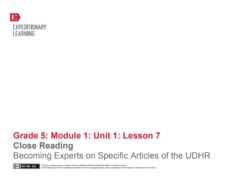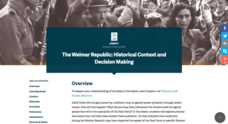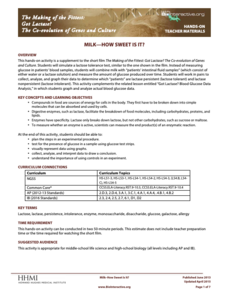Discovery Education
Artificial Intelligence
What makes human interaction different from interaction with computers? Learners consider the question as they build Turing tests to determine whether a computer thinks like a human. They begin by looking at current versions of Turing...
Curated OER
Aesop's Fables
Regale your class with renditions of Aesop's fables from the engaging, and beautifully illustrated book by Jerry Pinkney. Guide discussion to practice prediction, compare and contrast various stories, explore the connections between the...
Curated OER
All About Teeth
Chomp chomp! Learn which teeth perform which tasks with a thorough learning exercise on molars, incisors, and canines. Based on descriptions of each kind of tooth, fifth graders label a diagram that points to particular teeth. They then...
Curated OER
Bite on This!
Different types of teeth have different roles. Third graders study how molars, incisors, and canines function in a rabbit skull and a cat skull. After answering some questions about the teeth of herbivores and carnivores, kids...
Curated OER
Antibiotic Attack
Students examine how antibiotics work and why they are effective. In this antibiotic lesson, students discover that when harmful germs get inside the body, the immune system may not be strong enough to fight the germs off. Students...
Michigan State University
Bug Lyphe!
Introduce ecology classes to biodiversity and interdependence in ecosystems with a PowerPoint presentation. Then, they get up-close and personal with the invertebrate world by collecting insects, classifying them, and graphing their...
Space Awareness
History of the Universe
Your pupils may believe that you and their parents are the oldest things in the universe, but surprise! There are elements of the universe that are even older. Elementary scientists create a class timeline to demonstrate the...
EngageNY
Close Reading: Becoming Experts on Specific Articles of the UDHR
A continuation of the previous lesson, which is part of a larger group of lessons on human rights (see additional materials). Here, in Lesson 7, your class will explore more articles from the Universal Declaration of Human Rights. After...
Wild BC
Greenhouse Gas Guzzlers
Teams of six to eight players imagine that they are driving in a vehicle and collect balls that represent carbon dioxide emissions based on their different activities. "Greenhouse Gas Guzzler" cards tell teams how many balls to collect...
Curated OER
Shaking the Movers: Youth Rights and Media
Children have rights! Exploring those rights and using media to express those rights is the focus of this Media Awareness Network lesson. Although some of the law links reflect the Canadian Articles of The Convention, the majority of the...
Prince William Network
Migration Headache
During this game, kids become migratory shorebirds and fly among wintering, nesting, and stopover habitats. If they do not arrive at a suitable habitat on time, they do not survive. Catastrophic events are periodically introduced that...
WolfQuest
The Return of Gray Wolves to Yellowstone National Park: Right or Wrong?
Should gray wolves be removed from Yellowstone National Park? After researching the complex relationships between the various habitats and species at Yellowstone National Park, including humans, class members take a position...
Howard Hughes Medical Institute
Lactose Intolerance: Fact or Fiction
Around the world, about 2/3 of adult humans are lactose intolerant. Scholars work in small groups to discuss a few statements about lactose intolerance. Then, they watch a video on the topic and readdress each statement. Whole-class...
Nemours KidsHealth
Alcohol: Grades K-2
Two lessons focus on alcohol's effects on the human body and encourage participants to make responsible choices. First, scholars identify five adults they can turn to for guidance and craft a construction paper hand that lists the...
Curated OER
Fueling Body Activities - Digestion
Not only is the human digestive system covered in this biology worksheet, learners will also explore the digestive process of other animals. The 30 short-answer questions address modes of heterotrophic nutrition, the function of each...
Curated OER
Blood
Although there are vocabulary terms in this PowerPoint that use British spelling, the presentation is attractive and educational. The content flows from the general composition of blood, into the different types of blood cells and their...
EngageNY
Close Reading: Unpacking Specific Articles of the UDHR
Lesson 6 of this extensive unit finally has your class begin to work their way through specific articles from the text of the Universal Declaration of Human Rights (UDHR). Before examining the rights actually detailed in the...
Pulitzer Center
The Global Water Crisis
High schoolers examine the "quiet crisis," the lack of clean water, by reading articles and viewing video clips. They discuss the situations in Ethiopia, Yemen, Kenya, and Nepal. There are two options for the lesson plan, but one of them...
Habitat Conservation Trust Foundation
Greenhouse Gas Game
You will need to gather a number of tokens, bags, and other various game components in order to incorporate this activity into your curriculum. Different tokens represent carbon dioxide, methane, and nitrous oxide. Printable 8.5"x11"...
Vanderbilt University
Healthy Bodies for Girls
Make human growth development education an inclusive experience with a guide to puberty designed to support girls with disabilities. Topics include exercise, hygiene, menstruation, and more!
K20 LEARN
Lord of the Flies Unit, Lesson 4: Bad to the Bone
Is the nature of humans inherently good or evil? That is the question scholars consider in the fourth lesson of the Lord of the Flies unit. In a Four Corners activity, they examine statements about human nature and stand by the poster...
Facing History and Ourselves
Us and Them: Confronting Labels and Lies
Stereotyping and discrimination based on religion catalyze many atrocities in the world. Explain the awful treatment of Jews and the lies Nazis spread by using an informative yet sensitive resource. Learners participate in a warm-up and...
Howard Hughes Medical Institute
Milk—How Sweet Is It?
Have you ever wondered why some people are lactose intolerant? Participants test simulated patients in a hands-on lab activity to find out! They learn about lactose intolerance by performing an experiment, analyzing data, and drawing...
Facing History and Ourselves
Making Rights Universal
Class members continue their discussion of Universal Declaration of Human Rights (UDHR). After examining an infographic the summarizes the document, groups examine four of the rights to decide if they are or are not universal, and if...
Other popular searches
- Arts and Humanities
- Humanities and Music
- Humanities and Culture
- Art and Humanities
- Integrated Humanities
- What Are the Humanities
- Humanities Ancient Greece
- Humanities Africa
- Arts Humanities
- Arts; Humanities
- Primary Humanities
- Humanities Morality Plays























